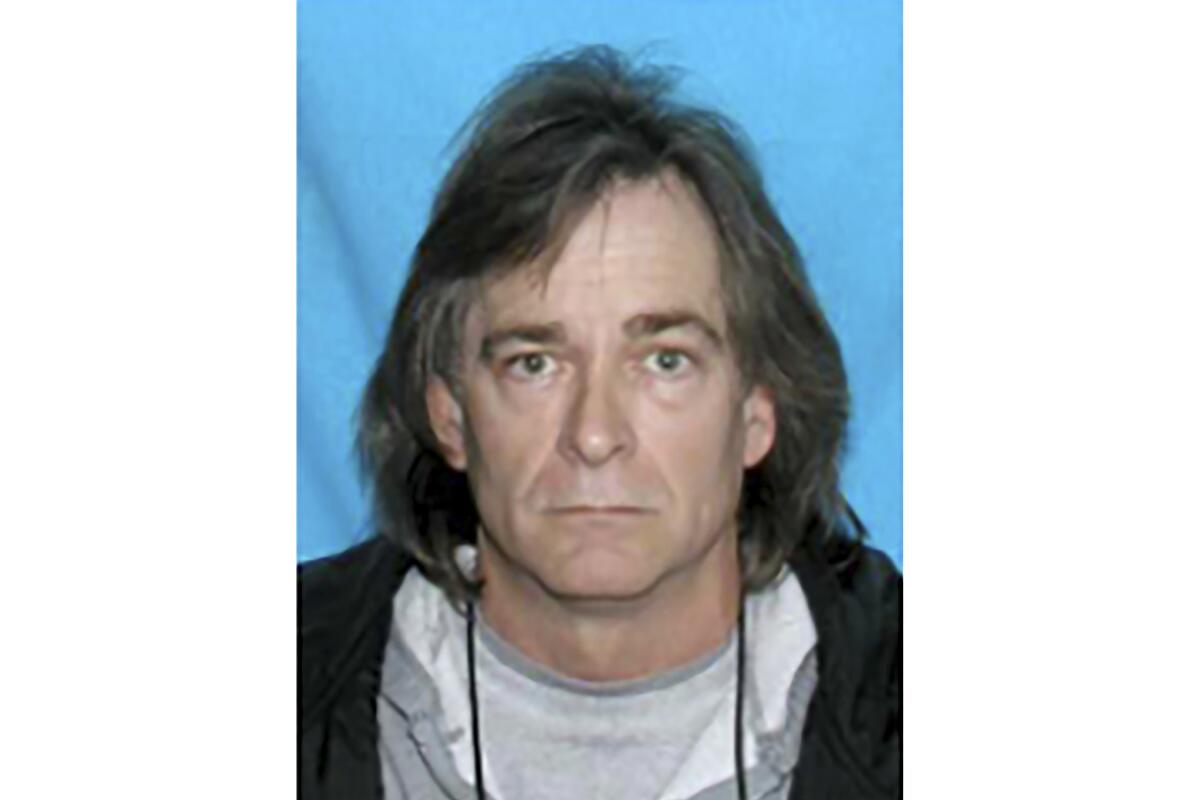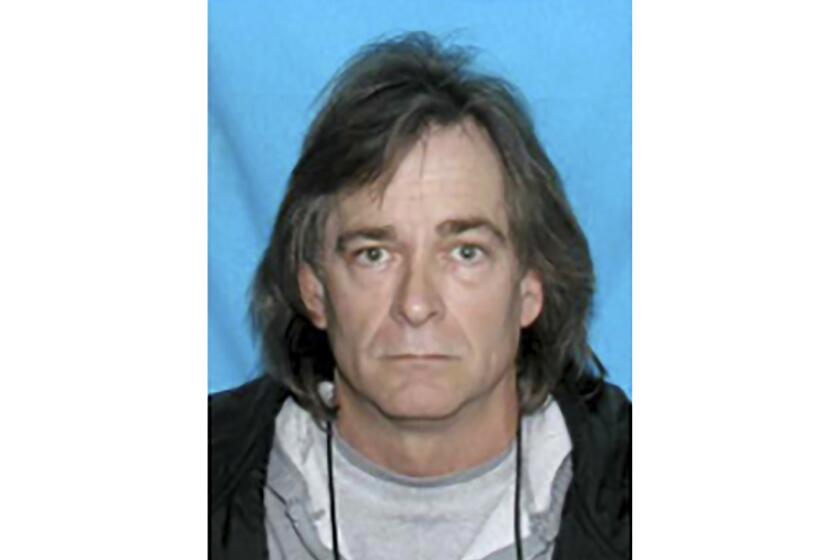Nashville man’s girlfriend warned police that he was building bombs

- Share via
NASHVILLE — More than a year before Anthony Quinn Warner detonated a bomb in downtown Nashville on Christmas Day, officers visited his home after his girlfriend told police he was building bombs in an RV trailer at his residence, according to documents obtained by the Associated Press. But the officers were unable to make contact with him or see inside his RV.
Those revelations, contained in a newly disclosed 2019 incident report, put Nashville’s police chief on the defensive Wednesday as he said his officers did nothing wrong and handled the situation properly. He added that other than a 1970s marijuana-related arrest, Warner was “squeaky clean.”
“I believe the officers did everything they could legally. Maybe they could have followed up more, hindsight is 20/20,” Metro Nashville Police Chief John Drake said at a news conference.
Officers were called to Pamela Perry’s Nashville home on Aug. 21, 2019, following a report from her attorney that she was making suicidal threats while sitting on her front porch with firearms, the Metro Nashville Police Department said in a statement. A police report said Raymond Throckmorton, the attorney, told officers that day that he also represented Warner.
According to the incident report, when officers arrived, police said Perry had two unloaded pistols beside her on the porch. She told them that the guns belonged to “Tony Warner” and that she did not want them in the house any longer. Perry, then 62, was taken for a psychological evaluation after speaking to mental health professionals.
“During that visit, before leaving for the evaluation, Perry told police that her boyfriend was making bombs in an RV,” the report stated.
The report says that police went to Warner’s home, about a mile and a half away, but that he didn’t answer the door when they knocked repeatedly. They saw the RV, but it was in a fenced-off backyard and officers couldn’t see inside the vehicle. They also spotted several security cameras and wires attached to an alarm sign on a front door.
“They saw no evidence of a crime and had no authority to enter his home or fenced property,” the police statement said, adding that supervisors and detectives were then notified.
“If we could have had more to go off of, it would have been good,” Drake said.
The man believed to have carried out the Nashville bombing told a neighbor days earlier that the city and the world would never forget him.
Law enforcement officials did not publicly release the report, which was obtained only after news outlets submitted public records requests. Later, the Tennessee Bureau of Investigation announced that Warner’s only arrest was for a 1978 marijuana-related charge.
David Rausch, the TBI’s director, had told reporters this week that Warner was not on the state agency’s radar. Rausch was flanked by federal and state officials — including Drake — who did not object to or amend the statement.
Drake later told reporters Wednesday that he didn’t learn of the report until late Sunday, but he said he believed his officers when they said that they could not smell any explosives and that there was no probable cause for a search warrant. He also added that he didn’t know why Rausch said Warner wasn’t on anyone’s radar.
Wednesday’s developments came as federal agents were continuing to examine Warner’s digital footprint and writings, a law enforcement official said.
Throckmorton told the Tennessean newspaper that Perry had fears about her safety and thought Warner might harm her. Throckmorton was also at the scene that day and told officers that Warner “frequently talks about the military and bomb making,” the police report said. Warner “knows what he is doing and is capable of making a bomb,” Throckmorton said to responding officers.
After officers visited Warner’s home, the Police Department’s hazardous-devices unit was given a copy of the police report. During the week of Aug. 26, 2019, the unit contacted Throckmorton. Police said officers recalled Throckmorton saying that Warner “did not care for the police” and that he would not allow Warner “to permit a visual inspection of the RV.”
Throckmorton disputes that he told police they couldn’t search the vehicle. “I have no memory of that whatsoever,” he told the Tennessean. “I didn’t represent him anymore. He wasn’t an active client. I’m not a criminal defense attorney.”
Throckmorton told the newspaper that he represented Warner in a civil case several years ago and that Warner was no longer his client in August 2019. “Somebody somewhere dropped the ball,” he said.
“Of all the thousands of songs — why this one?” singer Petula Clark wonders after her `1964 hit, “Downtown,” was played in the Nashville bombing on Christmas.
A day after officers visited Warner’s home, the police report and identifying information about Warner were sent to the FBI to check their databases and determine whether Warner had prior military connections, police said.
Later that day, the Police Department said “the FBI reported back that they checked their holdings and found no records on Warner at all.” FBI spokesman Darrell DeBusk told the Tennessean that the FBI had conducted a standard agency-to-agency record check.
Six days later, “the FBI reported that Department of Defense checks on Warner were all negative,” the police department said.
No other information about Warner came to the department or the FBI’s attention after August 2019, police said. “At no time was there any evidence of a crime detected and no additional action was taken,” the statement said. “The ATF [Bureau of Alcohol, Tobacco, Firearms and Explosives] also had no information on him.”
Warner’s only arrest was on suspicion of a 1978 marijuana-related offense.
News Alerts
Get breaking news, investigations, analysis and more signature journalism from the Los Angeles Times in your inbox.
You may occasionally receive promotional content from the Los Angeles Times.
The Nashville bombing happened on Christmas morning, well before downtown streets were bustling with activity. Police were responding to a report of shots fired when they encountered the RV blaring a recorded warning that a bomb would detonate in 15 minutes.
Then, for reasons that may never be known, the audio switched to a recording of Petula Clark’s 1964 hit “Downtown” shortly before the blast. Dozens of buildings were damaged and several people were injured.
Investigators have not uncovered a motive for the bombing, nor was it revealed why Warner had selected that particular location, which damaged an AT&T building and wrought havoc on cellphone, police and hospital communications in several Southern states as the company worked to restore service. The company said Monday that the majority of services had been restored for residents and businesses.
More to Read
Sign up for Essential California
The most important California stories and recommendations in your inbox every morning.
You may occasionally receive promotional content from the Los Angeles Times.













